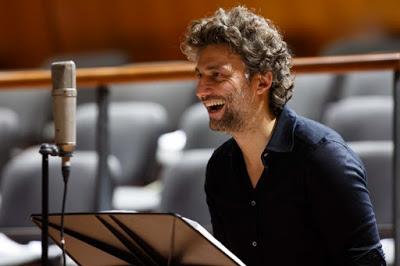by Paul J. Pelkonen

Studio warrior: Jonas Kaufmann recording Aida in Rome.
Photo © 2015 Warner Brothers Classics.
Aida is a visual opera, with giant crowd scenes, pyramids, the Nile river and other Egyptological stimulants that add to its sense of spectacle and scope. This creates a problem for the record producer, tasked with creating imaginary Cecil B. de Mille-size crowd scenes through careful mic'ing of the chorus and placement of the singers. It is also necessary for the simple, almost classicist love triangle to play out convincingly without appearing hackneyed. Ditto for the sub-plot of Aida's troubled relationship with her father Amonasro. With no scenery to hide behind, the individual performances must carry the day.
This recording, laid down in February, 2015 features Sir Antonio Pappano at the helm of the Orchestra and Chorus of the National Academy of Saint Cecilia, captures that intimacy in a slow, measured account that sprawls over three generous discs. Sir Antonio knows this orchestra and chorus, having served as its music director for the past decade. The recording venue was the Parco della Musica in Rome, a vast and acoustically accommodating hall that allowed producer Stephen Johns to re-create offstage trumpets, grand processions and the close acoustic of an Egyptian tomb for the opera's suffocating final scene.
The biggest star here is tenor Jonas Kaufmann, who has made his reputation with the title roles in like Lohengrin, Parsifal and Faust. He comes to Radames with a clean and pleasing, vaguely Italianate timbre and a secure lower register, bed-rock in which to anchor the key high notes. Mr. Kaufmann's authentic approach to this role is refreshing, showing scholarship and respect for the music as written. For example, he chooses to sing the last phrase of "Celeste, Aida" pianissimo (as Verdi intended) and refrains from hamming it up in the big ensembles. He sounds secure and confident all the way to the end, using his abilities as an actor to convey despair and resignation in the Tomb Scene.
Anja Harteros, who has worked with Mr. Kaufmann on four other Verdi operas before this one is well cast as Aida, singing the part of the distressed Ethiopian slave girl with careful guidance from Sir Antonio and a sure command of the vocal line. She captures the inner conflict of the character in "Ritorna vincitor," the Act I monolog that veers between confidence in Radames and pleas for pity from the gods. Better still is her atmospheric "O patria mia," a performance that confirms Verdi's wisdom in making this famous aria a very late addition to the score. She and Mr. Kaufmann sing with heart-melting tone in the final "O terra, addio."
Ekaterina Semenchuk's mezzo is focused and bright, bringing personality to Amneris beyond the cold-hearted, spoiled princess. Her character does a reverse in the final act, when she rails against the priests and their decision the execute Radames, suddenly becoming a pacifist where once she was a leading war-hawk. The three singers are particularly fine in the divided ensemble that ends the opera, with Aida and Radames slowly expiring below the altar and Amneris uttering prayers for peace in the temple above. The clean, clear acoustic makes one imagine the divided stage, even as the voices skilfully overlap.
Erwin Schrott is rock-solid as Ramfis, fatherly in the first act and stolidly inflexible in the rest of the opera. As Amonasro, Aida's father (and leader of the Ethiopian army) Ludovic Tézier blusters through the second act but turns oily and persuasive in the crucial third. Marco Spotti is dark-voiced and effective as the Pharoah, and Eleonora Buratto sings with beauty and persuasion as the off-stage priestess in the Grand Consecration Scene. Both this and the spectacular Triumph take advantage of the wide stereo palette, and provide compelling and imaginative experiences for the listener.

